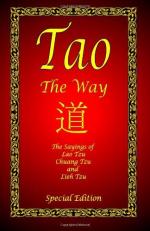|
This section contains 4,898 words (approx. 17 pages at 300 words per page) |

|
LAOZI, a quasi-historical figure who came to be revered as a supreme godhead in Chinese Daoist and popular religious traditions. His divinity is understood to be both transcendent and immanent. The Dao de jing, also known simply as the Laozi, is traditionally attributed to him. By mid-Han times (206 BCE–220 CE), this text and the Zhuangzi (c. fourth to third century BCE) were regarded as the cornerstones of early Daoist thought.
Lao Dan, the Teacher of Confucius
There is no textual evidence that the Dao de jing itself existed prior to about 250 BCE, although various sayings in the text were in circulation somewhat earlier. It is thought that those who valued this literary heritage as an alternative to the teachings associated with Confucius began to attribute it only retrospectively to a Laozi. The source of inspiration for this hypothetical spokesman was a presumably historical figure known only as Lao...
|
This section contains 4,898 words (approx. 17 pages at 300 words per page) |

|


